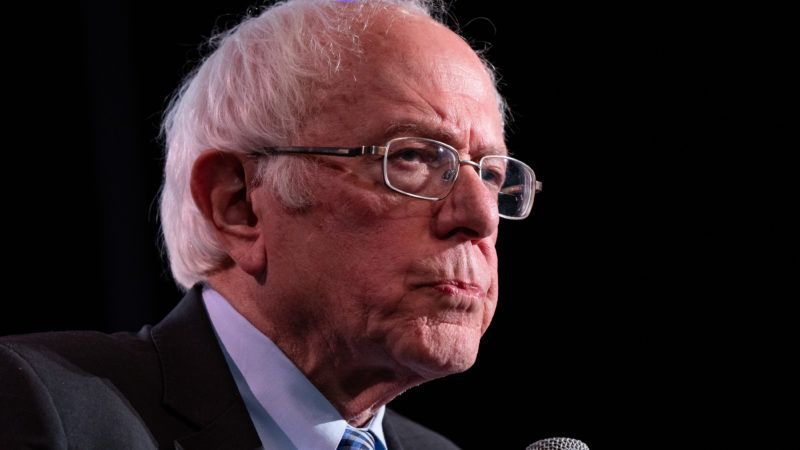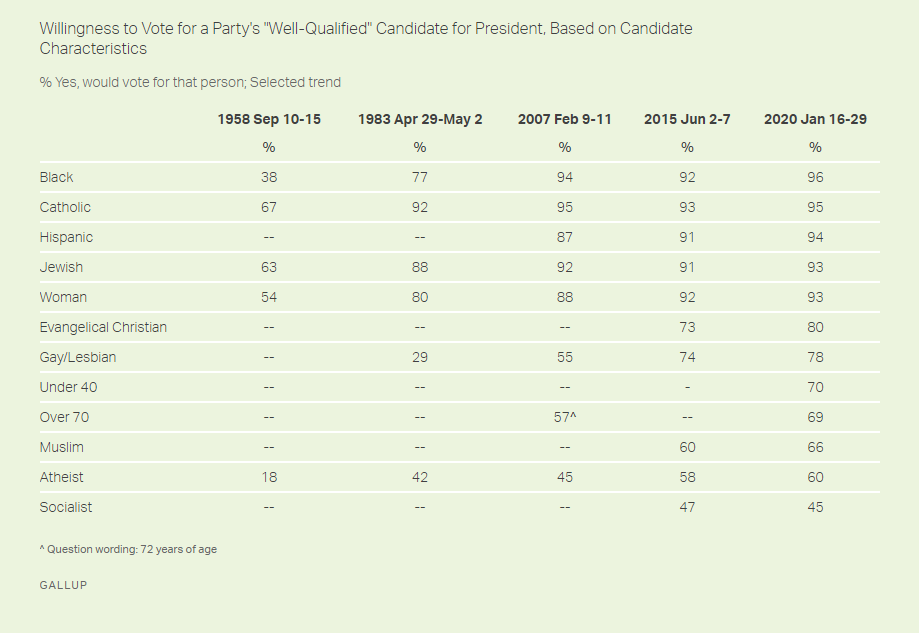The Good News Is That We Probably Won't Elect a Socialist. The Bad News Is That We Already Have, Many Times.
Americans probably don't want a president who will nationalize the means of production, but we're happy to keep electing ones who grow government spending.

So Sen. Bernie Sanders (I–Vt.) has won the New Hampshire primary, after coming in an oh-so-close second place in the Iowa caucuses last week (where he actually won more total votes en route to silver than the declared winner). The bad news for him comes from a new Gallup poll asking whether Americans would vote for various types of candidates, including black ones, Jewish ones, female ones, ones over the age of 70, and more. Gallup finds:
Just one group tested—socialists—receives majority opposition. Less than half of Americans, 45%, say they would vote for a socialist for president, while 53% say they would not.
Even atheists, long a group shunned by voters, did better, with 60 percent of respondents saying godlessness would not be a problem (that's up from 45 percent in 2007). Worse still, Gallup notes that "last measured these attitudes, in 2019, the results were within a few percentage points of those found today." In fact, socialism seemed less a votekill back in 2016, when 47 percent of respondents said that they were willing to vote one in.

Still, Bernie's persistence and strong showing have centrist Democratic commentators seeing red. "To nominate Sanders would be insane," writes Jonathan Chait of New York magazine, who contends:
His vulnerabilities are enormous and untested. No party nomination, with the possible exception of Barry Goldwater in 1964, has put forth a presidential nominee with the level of downside risk exposure as a Sanders-led ticket would bring.
Yet among left-leaning Democrats, Sanders would represent nothing more than Democratic status quo. At Vox, Matthew Yglesias coos, "On the vast majority of issues, a Sanders administration would deliver pretty much the same policy outcomes as any other Democrat." The big exceptions, say Yglesias, are foreign policy and monetary policy, "where Sanders takes issue with an entrenched conventional wisdom that is deeply problematic."
Despite Sanders beating President Donald Trump in the averages of most head-to-head polls, only diehard Bernie bros seem fully confident that Vermont's self-declared socialist would go on to beat the president in the fall election (even Yglesias discounts recent polls, agreeing "it's a reasonable concern" that Sanders' edge would withstand "the sure-to-come cavalcade of attack ads from Trump").
That's putting it mildly. Progressives can claim that, despite surveys such as the new Gallup one, Americans really want "socialism," but there's a reason that no one as explicitly left as Sanders has been nominated—much less won—the presidency.
For libertarians, however, the reason gives cold comfort: Americans don't even need to leave the comfort of the Republican Party to get a spendthrift president who may not be a declared socialist but nonetheless grows the size, scope, and spending of the federal government. Leaving aside the question of whether a president's budget proposal has a chance of being enacted as is, spending under Trump has already skyrocketed and it will go even higher if he gets his 2021 spending plan approved. Chris Edwards of the Cato Institute calculates that inflation-adjusted federal spending would climb by 10 percent (not including interest costs) during his first four years in office. Using an alternative method that only uses "actual budget amounts for the 2020 fiscal year" and compares them to ones from 2016, The New York Times' Alicia Parlapiano and
Americans may not want a socialist per se, especially one who promises to nationalize health care and create something approaching a single-payer system not only for K-12 education (we already effectively have that) but for higher education, too. But they seem totally ready to re-elect Donald Trump, whose approval rating has soared to as high as 50 percent in some recent polls.* And if it's not Trump or Sanders, it will be someone who goes along with spending more than what we are already spending, which is more than what we were spending a year ago.
CORRECTION: The original version of this story incorrectly stated President Trump's approval rating had reached 55 percent in recent polls. The correct figure is 50 percent, per several Rasmussen Reports surveys.


Show Comments (169)